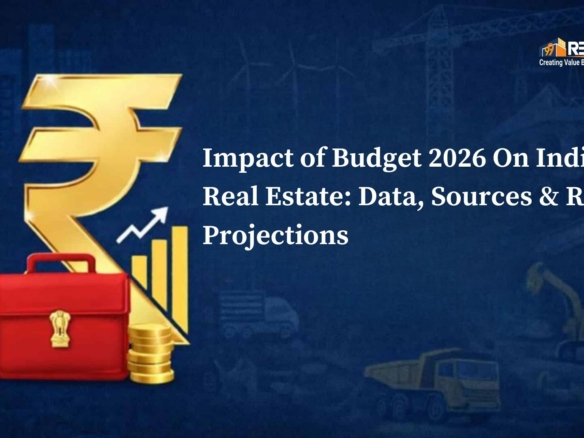India’s real estate market is profoundly influenced by a confluence of economic factors, including GDP growth, interest rates, inflation, employment trends, and government policies. Stakeholders must stay informed and adaptable to navigate this dynamic landscape effectively. We have compiled some of the common questions for our readers benefit in these FAQs
Why do real estate prices in metro cities keep rising despite economic slowdowns?
Real estate prices in metropolitan cities often continue to rise due to factors such as limited land availability, high infrastructure costs, and sustained demand from affluent buyers. Even during economic downturns, the scarcity of prime land and the desire for premium locations keep property values elevated.
What happens to under-construction projects when interest rates rise?
When interest rates increase, borrowing costs for developers escalate, leading to potential delays in under-construction projects. Higher financing expenses can cause developers to slow down construction or postpone new project launches. Additionally, increased home loan rates may deter buyers, further impacting project timelines and cash flows.
Decoding Interest Rates How They Impact Your Home Loan and Mortgage Payments
How does inflation affect rental yields in India?
Inflation can lead to higher rental yields in India. As the cost of living rises, property owners may increase rents to offset their own increased expenses, such as maintenance and utilities. This adjustment helps landlords maintain their profit margins, resulting in improved rental yields, particularly in high-demand urban areas.
Why is real estate investment in tier-2 cities growing faster than in metros?
Real estate investment in tier-2 cities is experiencing rapid growth due to factors like lower property costs, improved infrastructure, and the rise of remote work trends. These cities offer more affordable housing options and a better quality of life, attracting both investors and homebuyers seeking alternatives to the expensive and congested metropolitan areas.
Real Estate Growth in Tier II and III Cities of India: A Game Changer for 2024
How do stock market fluctuations impact luxury real estate sales?
Stock market performance can influence luxury real estate sales. A bullish stock market boosts investor confidence and increases liquidity, leading to higher investments in luxury properties. Conversely, during stock market downturns, potential buyers may adopt a cautious approach, resulting in a slowdown in high-end property transactions.
The Surge in India’s Luxury Residential Market: An In-Depth Analysis
How does a slowdown in India’s IT sector impact real estate demand?
A slowdown in the IT sector can significantly affect real estate demand, especially in technology hubs like Bengaluru, Pune, and Hyderabad. Reduced hiring or layoffs in IT companies lead to decreased housing demand in these regions, as job uncertainties make potential buyers hesitant to invest in property.
The ‘Coldplay Effect’ in Indian Real Estate: A Deep Dive into Symbolic Consumption and Its Economic Implications
What role does foreign investment play in India’s commercial real estate growth?
Foreign investment plays a pivotal role in India’s commercial real estate growth. Liberalized FDI policies and the introduction of Real Estate Investment Trusts (REITs) have attracted substantial foreign capital, leading to the development of large-scale office spaces, retail centers, and industrial parks. This influx of investment has enhanced infrastructure and contributed to the sector’s expansion.
The Ultimate Guide to Real Estate Investment Trusts (REITs)
How do government policies influence the real estate market in India?
Government policies significantly impact India’s real estate market. Initiatives like the Pradhan Mantri Awas Yojana (PMAY) promote affordable housing, while the Real Estate (Regulation and Development) Act (RERA) enhances transparency and protects buyers’ interests. Tax incentives and infrastructure development plans also stimulate investment and growth in the sector.
Understanding RERA Escrow Account: Safeguarding Homebuyers
What are the current trends in India’s residential property market?
The Indian residential property market is witnessing a surge in demand for premium and luxury housing. In the first half of 2024, units priced above INR 10 million accounted for 41% of total sales across major markets, indicating a shift towards higher-priced properties. This trend is driven by increased savings, minimal income disruptions among affluent groups, and a positive economic outlook.
Key Real Estate Trends for 2024-2026
How has the COVID-19 pandemic affected India’s real estate sector?
The COVID-19 pandemic initially led to a significant slowdown in India’s real estate sector due to lockdowns and economic uncertainty. However, the market has shown resilience, with a notable recovery in residential sales and commercial leasing as restrictions eased. The pandemic has also accelerated the adoption of digital technologies in property transactions and increased demand for homes with better amenities, reflecting changing buyer preferences.
How does India’s GDP growth affect the real estate market?
India’s GDP growth directly influences the real estate sector. A robust economy boosts consumer confidence, leading to increased demand for housing and commercial properties. Conversely, economic slowdowns can dampen market sentiment, resulting in reduced property transactions.
Comprehensive Guide to GST on Real Estate in India
What impact do interest rates have on housing demand in India?
Interest rates, set by the Reserve Bank of India (RBI), significantly affect housing affordability. Lower rates make home loans more accessible, stimulating demand, while higher rates can deter potential buyers due to increased Equated Monthly Installments (EMIs).
How does inflation influence real estate prices in India?
Inflation affects real estate through increased construction costs and potential adjustments in rental yields. Rising material costs can lead developers to increase property prices, and higher inflation may prompt property owners to adjust rents, impacting affordability.
What role does Foreign Direct Investment (FDI) play in India’s real estate growth?
FDI has been instrumental in developing India’s commercial real estate sector. Liberalized policies have attracted investments, particularly in office spaces and retail developments, enhancing infrastructure and contributing to economic growth.
Unprecedented Surge in QIP Fundraising: Real Estate Sector Dominates with ₹22,320 Crore in 2024
How do employment and income levels affect housing demand in India?
Higher employment rates and increased income levels drive demand for housing, especially in urban centers. Economic hubs like Bengaluru, Pune, and Hyderabad have experienced property value appreciation due to thriving industries and job opportunities.
India’s Real Estate Industry: The Next Employment Generation Hub
What is the impact of urbanization and migration on India’s real estate market?
Rapid urbanization and migration to cities for better employment opportunities have increased demand for housing, particularly in affordable and integrated township developments. Post-pandemic, tier-2 cities like Jaipur, Indore, and Lucknow have seen heightened housing demand due to hybrid work models.
What effect do stock market fluctuations have on real estate investments in India?
Stock market performance can influence investor confidence in real estate. A bullish market may lead to increased investments in luxury properties, while a downturn might prompt investors to consider real estate as a more stable asset.
How do different segments of the real estate market respond to economic conditions in India?
Luxury housing tends to be less affected by economic downturns, driven by high-net-worth individuals. Affordable housing is highly sensitive to economic shifts, with demand declining during downturns. Mid-segment housing is influenced by home loan interest rates and employment stability.
What is the future outlook for India’s real estate market considering current economic trends?
The future of India’s real estate market is influenced by factors such as potential interest rate reductions, continued urbanization, increased institutional investments, challenges in affordable housing supply, and technological advancements in property technology (proptech). These elements are expected to shape the market dynamics in the coming years.
Mivan Construction Technology: Revolutionizing Modern Construction
These insights provide a comprehensive understanding of the various factors influencing India’s real estate market, from economic conditions and government policies to emerging trends and investment patterns.
Subscribe to get updates on our latest posts and market trends.






Join The Discussion